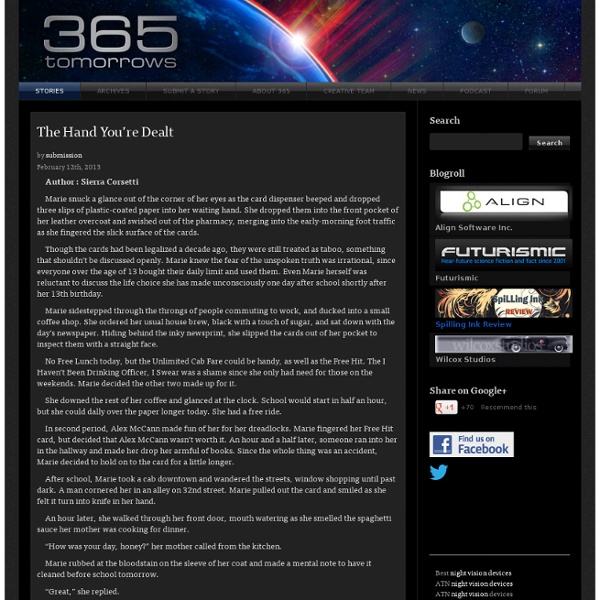



How to Build a Universe That Doesn't Fall Apart Two Days Later First, before I begin to bore you with the usual sort of things science fiction writers say in speeches, let me bring you official greetings from Disneyland. I consider myself a spokesperson for Disneyland because I live just a few miles from it — and, as if that were not enough, I once had the honour of being interviewed there by Paris TV. For several weeks after the interview, I was really ill and confined to bed. I think it was the whirling teacups that did it. Elizabeth Antebi, who was the producer of the film, wanted to have me whirling around in one of the giant teacups while discussing the rise of fascism with Norman Spinrad... an old friend of mine who writes excellent science fiction. Science fiction writers, I am sorry to say, really do not know anything. It reminds me of a headline that appeared in a California newspaper just before I flew here. Well, I will tell you what interests me, what I consider important. But the problem is a real one, not a mere intellectual game.
A Newbie's Guide to Publishing Isaac Asimov - The Last Question The last question was asked for the first time, half in jest, on May 21, 2061, at a time when humanity first stepped into the light. The question came about as a result of a five dollar bet over highballs, and it happened this way: Alexander Adell and Bertram Lupov were two of the faithful attendants of Multivac. Multivac was self-adjusting and self-correcting. For decades, Multivac had helped design the ships and plot the trajectories that enabled man to reach the Moon, Mars, and Venus, but past that, Earth’s poor resources could not support the ships. But slowly Multivac learned enough to answer deeper questions more fundamentally, and on May 14, 2061, what had been theory, became fact. The energy of the sun was stored, converted, and utilized directly on a planet-wide scale. They had brought a bottle with them, and their only concern at the moment was to relax in the company of each other and the bottle. “It’s amazing when you think of it,” said Adell. Lupov cocked his head sideways.
Let’s Give Them Something to Talk About A common refrain arising out of last week’s Magic Under Glass cover controversy is that authors are afraid to speak out against their publishers — even over racial misrepresentation on their covers. It seems authors fear that if they speak out they could be labeled as troublesome, and that the label could prevent the publication of future books. Enhancing this fear is the fact that often when an author does speak out, other authors offer criticism rather than support. When Anne Stuart complained her publisher wasn’t adequately supporting her books, for example, many authors declared she was lucky to be published at all and noted there were others who would happily take her place. Fear of criticizing one’s publisher evinces a certain lack of faith in one’s work. By coincidence, during last week’s controversy, I received an email from Barry Eisler, whose French publisher, Belfond, has repeatedly chosen covers Barry finds weak. Will authors ever feel free to criticize publishers? Barry
10 great science fiction novels that have been banned @djscruffy: And that's why you're a heathen and should be burned at the stake. @djscruffy: In defense of public schools, I would suggest that the reason many of these books are challenged so often is that they're frequently included in school curriculums and libraries. I grew up in a state that, according to these links, engaged in book-burning less than a decade before my birth. That makes me shudder. But I'm also the child of a public school teacher and am familiar with my mother's and many of her peers' views on children's reading materials. I suppose I've wandered a bit. @djscruffy: To be fair, it's not usually the schools that want to ban the books, but the few overprotective parents who make wild assumptions about the books we try to teach. Most of us really try to teach the kids to think, rather than becoming nice little automatons.
.:: Sidera Visus ::. La Historia de Zoë – Scalzi, John Fuerzas de Defensa Coloniales 4 Tras La vieja guardia, Las Brigadas Fantasma y La colonia perdida John Scalzi nos trae el relato de Zoë, la historia más grande de la galaxia contada desde el punto de vista de su protagonista. «¿Cómo cuentas tu participación en el relato más grande de la historia? Lo pregunto porque es lo que tengo que hacer. Soy Zoë Boutin-Perry: miembro de una colonia aislada en un letal mundo pionero. Todos en la Tierra conocen la historia de la que formo parte. Sigue leyendo Archivado bajo .:: ESCRITORES ::., .:: LISTADO DE eBOOK ::., .:: LISTADO DE SAGAS ::., .:: LISTADO POR GÉNEROS ::., Ciencia Ficción, Fuerza De Defensa Coloniales, La Historia de Zoë, Scalzi, John Etiquetado con Ciencia Ficción, Descargar, ebook, ePUB, Fuerzas De Defensa Coloniales, John Scalzi, La Historia de Zoë, libros, PDF La Colonia Perdida – Scalzi, John Fuerzas de Defensa Coloniales 3 Sigue leyendo Las Brigadas Fantasma – Scalzi, John Fuerzas de Defensa Coloniales 2